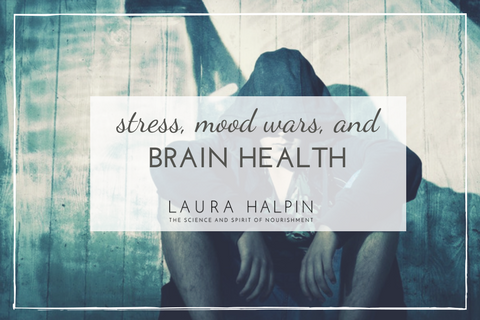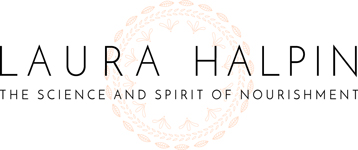
Stress, mood wars, and brain health
Worry does not empty tomorrow of its sorrow.
It empties today of its strength.
- Corrie Ten Boom
The benefits of happiness are immeasurable AND measurable. Happier people are more productive, more resilient, live longer, have stronger immune systems and earn more money over their lifetimes.
Unfortunately, Americans are an unhappy lot. In the U.S., almost one out of five people have anxiety disorders, one out of four women are on anti-depressants or anti-anxiety meds, and remarkably, the World Health Organization predicts that depression will be the second cause of death by 2020. 2020!
The western medical system’s response? Meds. Yet, the efficacy of anti-depressants for mild and moderate symptoms are questionable, and in most cases, exercise is equally effective and isn't accompanied by a laundry list of side effects.
Brain Chemistry 101
Most of us understand that when someone is diagnosed with depression, ADHD, anxiety or develops an addiction, there is a brain chemistry issue at hand. Yet our understanding needs to expand from there. Brain chemistry does not exist in a vacuum, nor is it stagnant or impervious to input. If it was, we wouldn't be using meds like Prozac and Ritalin to change our chemistries.
We feel energetic, focused, optimistic, confident, calm - or anxious, depressed, pessimistic and scattered - due to our bodies' abilities to produce neurotransmitters and have them taken up by neurons in adequate amounts. Yet, we must be ingesting the raw materials (protein) needed to make neurotransmitters. We also need certain nutrients and enzymes to break down dietary proteins into amino acids and convert them into neurotransmitters like serotonin, dopamine, melatonin and others. For example, one nutrient necessary to convert an amino acid called tryptophan into serotonin is B6.
Sometimes, even if we are ingesting sufficient protein and vitamins, there is an absorption issue. We might have GERD or acid reflux (which is most often caused by a LACK of stomach acid, not TOO MUCH!) and take an acid pump inhibitor. Yet we need stomach acid to break down our protein, and to absorb nutrients like iron and B12. Taking care of gut health may seem like a random approach to easing anxiety or depression, but gut health is a major factor.
Some people have a decreased ability to rid their bodies of the thousands of chemicals we are exposed to -- and this toxic overload can severely impact one's brain health.Therefore, tending to our liver health needs to be part of the protocol.
It may sound complicated. Looking at one's body holistically certainly isn't a linear process. Our bodies are elegant, complex, intelligent ecosystems that can be thrown off if we take a synthetic medication to deal with our health issues at the symptom level.
If we struggle with anxiety, depression, ADHD, addictions...a med might help relieve our symptoms, but it won't fully heal us. This is not to say that a medication is never warranted. Not at all.
What’s your thought life like?
Recently, I attended a seminar taught by biopsychologist Brian E. King, PhD. He’s devoted much of his career to the study of the brain and how it forms habits of unhappiness or happiness. Yes, we are all influenced by our genetics, but they only account for about half of our happiness. Only a small fraction of our happiness pie is determined by our circumstances (about 10%). The rest is determined by our habits and coping mechanisms which can be healthy or maladaptive.
According to King, “Anxiety (read stress) is the result of thousands of micro choices.” These micro choices become habits, which eventually become our disposition. Through awareness, self-compassion, practice and support, we can unravel these habits that bind us in depression and anxiety.
His seminar is complemented beautifully by the audio book I keep mentioning, Kelly McGonigal PhD’s The Neuroscience of Change.
The next series I’m teaching, “Working from the Inside Out: Brain Nourishment and Mood Balancing” will help participants develop the mindfulness practices that are effective and espoused by McGonigal, King and other neuroscience experts.
There's help to be had
The brilliance of functional practitioners is they are willing to look under the hood, rather than to pull out the prescription pad at the first mention of sadness or inability to cope or concentrate. Holistic nutritionists like me can help people wade through many layers of brain and mood balancing. For example, balancing blood sugar, addressing fatty acid imbalances, eliminating food additives, identifying food sensitivities, and addressing gut and liver health through food are all angles to pursue. Supplements, lifestyle practices and sleep can also be life changers. These can make an enormous difference in whether a kid can sit still in his seat and focus and whether you feel like getting out of bed in the morning. It can also be the difference between stagnation and growth in your own life.
I have to say I love what I do. In a recent workshop, one of my clients - after a lifetime of acute suffering - claimed that she's never felt better in her life. What did she do? Started cooking at home and eliminated dairy from her diet. Another client who never feels good and has suffered from multiple autoimmune diseases felt better within a day of going off gluten.
Depression, anxiety, overwhelming stress, ADHD and addictions are signs that the body is out of balance. Consider joining me in April to learn how to bring your body, or the body of someone you love, back into balance in safe and non-intrusive ways. It's all about giving the body what it needs so it can operate according to its elegant and innate brilliance.
Wishing you happiness and health,
Laura



